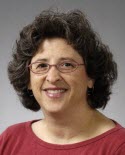- Partner schools include Cornell University and Camden County (N.J.) College
- $1.6 million expected over five years
- Program designed to increase graduation rates for deaf and hard-of-hearing STEM majors
The Center on Access Technology at Rochester Institute of Technology's National Technical Institute for the Deaf has been awarded a $1.6 million five-year grant from the National Science Foundation's Research in Disability Education program to establish a virtual academic community for college students who are deaf or hard of hearing and majoring in the STEM fields: science, technology, engineering or math.
The program is designed to increase graduation rates of deaf and hard-of-hearing STEM majors in postsecondary education in the long term. The grant team members will create a model that will provide remote tutoring and mentoring support and captioning and interpreting access services, via the cyber infrastructure, for deaf and hard-of-hearing students studying in mainstream colleges. Cornell University and Camden County (N.J.) College will be NTID's initial partners on the project. Although being piloted in the Northeast, the project seeks to implement a model that will be shared throughout the country.
"RIT has a national reputation for excellence in providing access and support services for deaf and hard-of-hearing students in the educational mainstream," says NTID President Gerry Buckley. "Our goal is to find efficient and effective innovations to support deaf and hard-of-hearing students in other mainstream colleges and universities around the United States. If we are successful at the college level, there is no reason our network cannot be applied at the high school level."
 Project Director Lisa Elliot, senior research scientist in the Center on Access Technology, says there are more than 30,000 deaf and hard-of-hearing students studying at colleges across the country. "Our goal is to see that they receive the best access and support services possible."
Project Director Lisa Elliot, senior research scientist in the Center on Access Technology, says there are more than 30,000 deaf and hard-of-hearing students studying at colleges across the country. "Our goal is to see that they receive the best access and support services possible."The current project is the culmination of two previous NSF grants awarded to Professor E. William Clymer of the Center on Access Technology. These projects were funded by NSF to assess the need for, and viability of, a virtual support network.
"Lisa's and Bill's efforts demonstrate the logical, thoughtful and systematic approach being taken by the center to develop solutions to assure that people who are deaf have access to education on par with their hearing peers." says Center on Access Technology Director James DeCaro, professor and NTID dean emeritus.
Taken from https://www.ntid.rit.edu/news/

